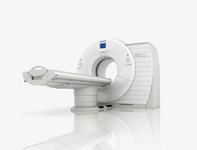
July 20, 2010 – New dual source CT technology allows a radiation dose of as low as one millisievert (mSv) for computed tomography angiography (CTA) scans, Siemens announced last week at the 2010 Annual Scientific Meeting of the Society of Cardiovascular Computed Tomography (SCCT) in Las Vegas. At SCCT, Somatom Definition Flash CT scanner users also showed how they use the system to display the coronary vessels, as well as the aorta, within one scan.
Recently, cardiologists have been using the Somatom Definition Flash to plan the procedure for one of the newest therapy methods for valvular heart disease: transcatheter aortic valve implantation (TAVI). Prior to this minimally invasive intervention, physicians had to examine the heart’s anatomy closely. This demand is also supported by the cardiovascular CT applications of the imaging software syngo.via. With automated processes, these applications can spare the cardiologists many manual steps that before were necessary – for instance, to measure the vessels.
“Somatom Definition Flash enables us to significantly reduce CTA radiation dose in clinical routine into the sub-mSv range for the vast majority of patients,” said Jörg Hausleiter, M.D., cardiologist and director of the intensive care unit at the German Heart Center in Munich, Germany.
Hausleiter and his colleagues have examined 60 to 70 percent of their patients with a radiation dose below one mSv. The Siemens scanner enables them to display the entire heart volume within only one heartbeat – independent of the patient’s heart rate. This is an improvement in CTA of the coronary vessels, where, until now, conventional technology has required considerably higher dose rates, and examinations in the sub-mSv range were only possible in very few patients. Dual Source CT allows scanning of every patient with high or irregular heart rates even without the use of beta blockers to slow down the heart rate. This means that even patients who cannot tolerate beta blockers may be spared referral to invasive angiography.
Somatom Definition Flash’s low-dose scanning potential also benefits patients with heart valve disease who were selected for a TAVI and must be examined by CT in order to plan the procedure. The minimally invasive TAVI treatment is particularly appropriate for older patients with a high perioperative risk during heart surgery. It links the implantation of an artificial heart valve with a balloon dilatation in the catheter laboratory. The great advantage is that the patient’s thorax must not be opened as the new valve is inserted through the femoral artery or through a small incision between the ribs.
For the preparation of this procedure, Somatom Definition Flash brings even more benefits to the user. TAVI patients are usually multimorbid and suffer from renal insufficiency. They can barely metabolize larger quantities of contrast agent that often have to be applied for a CTA to display the coronary arteries and the aorta.
“For us, Somatom Definition Flash is the best solution to plan a TAVI because it allows us to reduce contrast agent significantly,” said Tobias Pflederer, M.D., cardiologist at University Hospital Erlangen, Germany. “Single-source CTs, for example, require 100 or even 150 milliliters of contrast agent for assessing the abdominal aorta. With the Definition Flash, we need only 40 milliliters for the aorta and the coronary arteries.”
Prior to the TAVI treatment, the cardiologists need to clarify many anatomical issues regarding the vessels. They must know, for example, whether there are stenoses in the peripheral arteries. In that case, they could not insert the new valve through the femoral artery. Furthermore, they must determine the diameter of the aortic bulbus (initial part of the aorta) to select the right size of the artificial valve. syngo.via combines the application modules syngo.CT Vascular Analysis and syngo.CT Cardiac Function to display a dedicated TAVI planning workflow that helps physicians answer all these questions quickly and easily. The software, for instance, automatically exposes the aorta and its valves virtually. It reconstructs the vessel in the most important planes and automatically indicates the measurements that the physician has to conduct for his diagnosis.
For more information: www.siemens.com/healthcare


 January 05, 2026
January 05, 2026 









